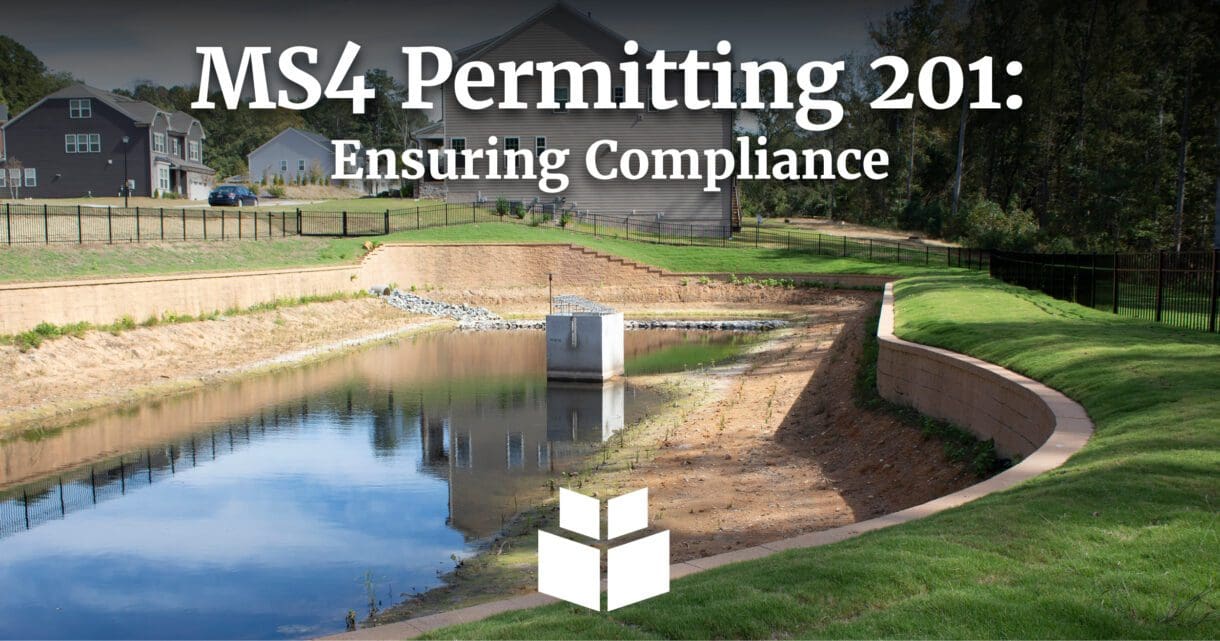
A Municipal Separate Storm Sewer System (MS4) is a community’s system of infrastructure that carries stormwater runoff into local bodies of water. Due to federal Clean Water Act mandates which have been delegated to the North Carolina Department of Environmental Quality (NCDEQ), communities of a certain population size are required to have a permit to discharge water from their MS4 system.
The ultimate goal of these permits is to improve the quality of stormwater runoff to protect local bodies of water. As part of the permit, communities are required to submit and implement a comprehensive Stormwater Management Plan (SWMP), which includes six control measures:
- Public Education & Outreach
- Public Involvement & Participation
- Illicit Discharge Detection & Elimination
- Construction Site Runoff Controls
- Post-Construction Site Runoff Controls
- Pollution Prevention & Good Housekeeping for Municipal Operations
WithersRavenel Director of Stormwater Dori Sabeh, PE, GISP, and Stormwater Engineer and Assistant Project Manager Alisha Goldstein, PE, recently addressed where many communities stand currently, and how WithersRavenel can help them navigate MS4 compliance and improve their community’s stormwater quality and infrastructure.
Current MS4 situation
Dori: The main goal of the program is to improve the quality of water entering water bodies. And this is stormwater runoff associated with rainwater, assuring that more of it is treated before it reaches those bodies of water to better protect our natural resources.
Alisha: Communities in North Carolina have been audited over the last 5 years. Most of them are trying to start completing their MS4 objectives in their permit requirements.
Dori: Now the program applies to Phase 2 communities – anything above a population of 10,000. This phase can also apply to communities in an urban area near a larger community.
The Phase 2 communities went through the audit and review from the state. They received their audit results and have prepared SWMPs to outline a plan for compliance. The state will be renewing permits for 45 communities over the next 18 months. Other smaller and growing communities will soon be entering the MS4 program as well.
Ensuring compliance
Dori: We understand and appreciate the value that the program provides for our environment and for communities. At the same time, we understand the budgetary constraints of these communities, especially smaller ones that are joining the program.
And that’s where we can help communities develop a stormwater management plan that is compliant, realistic, and achievable within the five-year term of the contract. We can help them with scheduling so that they can meet the requirements, and we can also assist them with funding and managing their resources.
Alisha: We can help communities develop the written forms or systems in place so that it’s easy to implement the best management practices. Whether it is tracking illicit discharge or inspecting stormwater control measures, having complete and accurate maps underlies these efforts. We can also survey infrastructure and provide a GIS database with photos. Having reliable maps and written operating procedures set up the framework for communities to implement their minimum measures and succeed in meeting compliance.
For example, we are working with an eastern North Carolina client on MS4 permitting. The community was initially permitted over five years ago, and they received a letter of noncompliance from the state after they were audited.
We updated their stormwater management plan so that they can be in compliance. It will address the notice of violation they got from their audit and then we will help them to submit for the new permit renewal. We also help communities with forecasting budget needs to address the goals laid out in the SWMP.
Looking ahead
Dori: For the communities that are growing and that will enter the program in the next year or so, it’s good for them to have the support we can provide them to understand their requirements and the implications of the plan they submit. It’s good to have realistic expectations.
Alisha: Additionally, we can help communities with stormwater and planning tasks that have links to MS4 measures related to construction site runoff controls and post-construction site runoff controls. A community may have restrictive development areas based on water supply watershed protection, riparian buffer, or floodplain regulation even if the community is not designated as an MS4 permittee. There are some communities that we are helping with plan reviews or floodplain reviews related to stormwater control measures, either because they have limited staff to handle the reviews or employee turnover.
Meanwhile, some communities are considering stormwater fees if they don’t have a funded program currently in place. That’s a direction some municipalities are examining to keep their infrastructure maintained and fulfill the minimum measure of their MS4 program. Our Stormwater and Finance Services departments are actively assisting communities in evaluating and implementing stormwater utilities to support their program needs.
WithersRavenel is working with communities across the state on ensuring MS4 compliance and on a range of projects and concerns related to the program. We’d love to talk with you about stormwater management and planning in your community. Contact Director of Stormwater Dori Sabeh at 919-678-3817 or dsabeh@withersravenel.com for more information.
Related article: MS4 Permitting: The Basics
